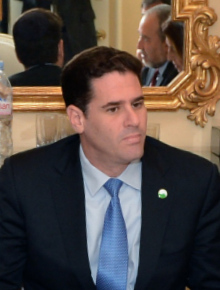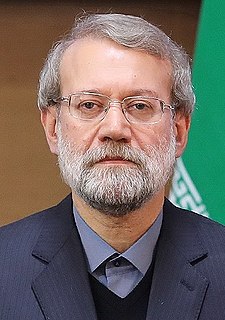A Quote by Mohammad Javad Zarif
Iran is a powerful country. Iran is a big country with a large population, natural resources, human resources. But we are a country that is content with its size, content with its geography. We have not engaged in any military adventures in the past 250 years. We don't see any of this as Iran trying to dominate this region. We see some people panicking in our region and we believe there is no need to panic. We are prepared to work with all our neighbors to ensure the security and prosperity of our region.
Quote Topics
Adventures
Any
Believe
Big
Content
Country
Dominate
Engaged
Ensure
Geography
Human
Human Resources
In The Past
Iran
Large
Military
Natural
Natural Resources
Need
Neighbors
Our
Panic
Past
People
Population
Powerful
Prepared
Prosperity
Region
Resources
Security
See
Size
Some
Some People
Trying
Work
Years
Related Quotes
Many countries that formerly saw Israel as an enemy now see Israel as a potential partner in addressing their primary security challenges. And so first and foremost, Iran. The rise of Iran, the empowerment of Iran has created a big change in the dynamics in the region. The second was the rise of ISIS.
That Iran is willing to threaten Israel is wrong[. . . .] We pose no threat and if we are conducting nuclear research and development we are no threat to Israel. We have no intention of aggression against any country. [. . .] Today we announce to you that the political will of Iran is aimed at the negotiated settlement of the case and we dont want to aggravate the situation in our region[. . . .] We know that this issue can be settled in a constructive dialogue and we welcome that.
In order to threaten Iran, you [America] say that you can secure the energy flow in the region. You are wrong. Beware that if you make the slightest mistake over Iran, the energy flow through this region will be seriously endangered. You will never be capable of providing energy security in this region. You are not capable and you should know this.
We support any deal that denies Iran nuclear weapons, that has a continuous and robust inspection mechanism and that has snap-back provisions in case Iran violates the agreement. Our concern is that Iran will use the income it receives as a result of the lifting of the nuclear sanctions in order to fund its nefarious activities in the region.
Americans have eliminated Iran's worst enemies, the Taliban in Afghanistan and Saddam [Hussein]. I occasionally threatened my Iranian counterpart in Kabul that one day I would send him a big bill for what we did. But, seriously, Iran is pursuing a dual strategy in Iraq. On the one hand, the Iranians, after decades of hostility, are now interested in good relations. On the other hand, they want to keep the country weak and dominate the region.
General [James] Mattis has said that the deal's in place. We can't unilaterally pull out of it without support from our allies because the sanctions wouldn't bite as deeply. And so he'll find other ways to push back against Iran in the various conflicts that Iran is fomenting around the [Iran] region.
Moreover, they [the Central Asian Republics] are of importance from the standpoint of security and historical ambitions to at least three of their most immediate and more powerful neighbors, namely Russia, Turkey and Iran, with China also signaling an increasing political interest in the region. But the Eurasian Balkans are infinitely more important as a potential economic prize: an enormous concentration of natural gas and oil reserves is located in the region, in addition to important minerals, including gold.
Now the world believes in Kurds, as they have become partners in that region. The West doesn't believe in the Iraqi government - not in Maliki before or Abadi today. It doesn't believe in Syria in any way, nor in Iran. So the Kurds could maybe work together with the Western world to bring stability to the region. It's a nice change, coming as it is after hundreds of years of the struggle of the Kurds.



































